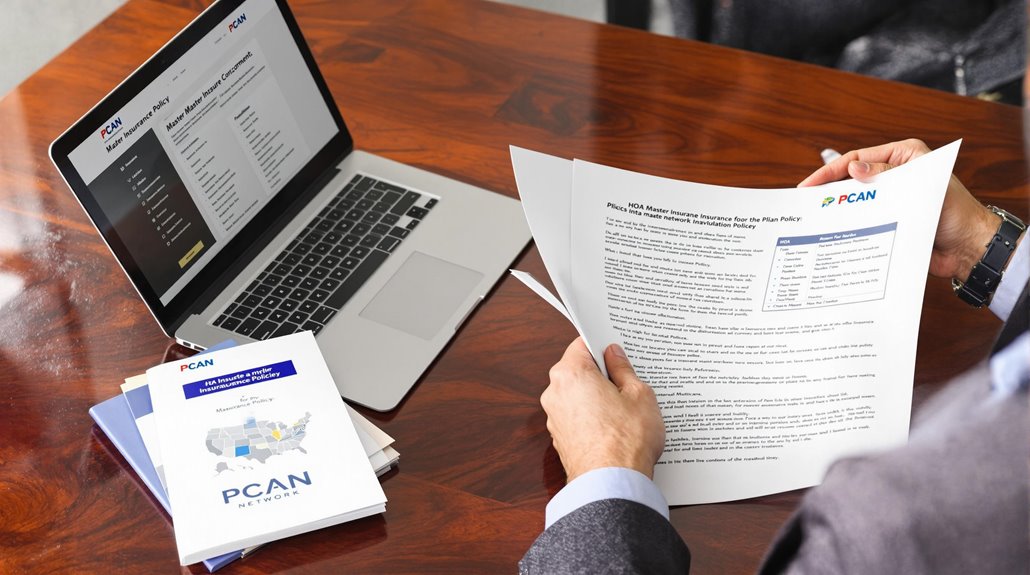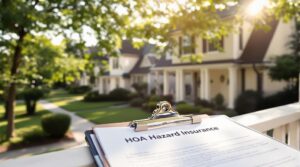Obtaining a HOA master insurance policy requires a formal written request to the property management company or direct contact with the association’s insurance provider. State laws mandate HOA compliance with documentation requests within specific timeframes. Homeowners should submit detailed requests specifying the need for either summary documents or complete policy documentation, while anticipating potential processing fees. For complex claims or policy interpretation, public adjusters can streamline the process and maximize settlement outcomes through professional negotiation and documentation expertise.
Key Takeaways
- Contact your HOA’s property management company or insurance provider directly to request the Certificate of Insurance and policy documentation.
- Submit a formal written request to your HOA board specifying exactly what documents you need and your deadline.
- Review your HOA’s governing documents to understand the proper submission process and any associated fees.
- Cite relevant state laws in your request, as many jurisdictions mandate specific timeframes for HOAs to fulfill documentation requests.
- Maintain copies of all requests and follow up through multiple channels if the initial request goes unanswered.
Understanding Master Insurance Policy Requirements
When purchasing or owning a condominium unit, understanding the master insurance policy requirements is vital for both legal compliance and personal protection. The policy serves as a critical component in condo sales transactions, providing necessary coverage details to lenders and protecting homeowners from potential liability issues.
State regulations govern the accessibility of master insurance policies, and homeowners have legal rights to obtain these documents from their condo associations or insurers. The requirements typically include specific coverage details that protect both individual units and common areas.
For ideal results when requesting the policy, homeowners should specify whether they need a thorough document or just a coverage summary.
Understanding these requirements becomes particularly important when dealing with HOAs, as some states regulate document preparation fees. Knowledge of state-specific laws regarding HOA document access guarantees homeowners can effectively navigate the process and address any resistance from uncooperative associations.
Direct Methods for Requesting Policy Documents

Obtaining a copy of the HOA master insurance policy involves several direct approaches that homeowners can utilize to access these essential documents.
Property owners can contact either the association’s insurance provider or property management company to request the Certificate of Insurance and complete policy documentation.
To streamline the process, requestors should review their HOA’s governing documents for specific submission requirements, as written requests may be mandated.
When submitting inquiries, it’s vital to clearly specify whether a full policy document or summary is needed. Homeowners should also anticipate potential processing fees, though some states regulate maximum charges for document preparation.
For enhanced effectiveness, residents can raise their documentation requests during HOA meeting open forums.
This approach not only creates a formal record of the request but also promotes transparency and may expedite the delivery of the necessary insurance documentation through proper channels.
Working With Property Management and HOA Board

A successful partnership with property management companies and HOA boards requires understanding their established protocols for document requests. When seeking a master insurance policy, homeowners should initiate direct communication with their property management company, clearly stating the purpose of their request and any relevant deadlines.
| Action Item | Response Strategy |
|---|---|
| Initial Contact | Submit formal written request |
| Documentation | Specify mortgage or sale requirements |
| Cost Inquiry | Request fee schedule upfront |
| Follow-up | Attend HOA meetings for updates |
Understanding state regulations regarding document access rights strengthens the homeowner’s position when making requests. Property management companies typically maintain standardized procedures for processing such inquiries, often requiring specific forms or documentation. By attending HOA meetings, homeowners can address any concerns directly with board members and expedite the document retrieval process. This approach demonstrates commitment and often results in more efficient communication channels between all parties involved.
Legal Rights and State-Specific Documentation

State laws establish specific parameters governing homeowners’ rights to access HOA documentation, including master insurance policies. These legal rights vary by jurisdiction, making it essential for property owners to understand their state’s specific regulations regarding document access and disclosure requirements.
HOA members can strengthen their position when requesting the master insurance policy by familiarizing themselves with applicable state statutes. Many jurisdictions mandate specific timeframes and procedures for HOAs to fulfill documentation requests.
Homeowners should prepare formal written requests that align with both state requirements and their HOA’s governing documents. This documentation should clearly specify the need for the master insurance policy, particularly when required for lending or compliance purposes.
Understanding and citing relevant state laws can provide homeowners with leverage if an HOA proves unresponsive to policy requests, potentially establishing grounds for enforcement through legal channels if necessary.
Tips for Expediting Your Policy Request

Expediting access to an HOA master insurance policy requires a strategic approach that combines clear communication protocols with proper documentation procedures.
To optimize the request process, homeowners should explicitly state their need for the Master Policy in written form, maintaining a copy for their records.
Understanding state-specific regulations regarding document access and fee limitations provides leverage when making the request. Homeowners can accelerate the process by inquiring about document preparation costs upfront and citing relevant state laws that support their right to access these materials.
Additionally, attending HOA meetings offers an opportunity to formally present the request during open forum sessions, potentially expediting the response timeline.
To guarantee maximum efficiency, requestors should follow up through multiple channels, including written correspondence with property management and direct communication with HOA board members, while maintaining detailed records of all interactions and submission dates.
The Benefits Of Consulting A Public Adjuster

A public adjuster brings specialized expertise to HOA insurance claims by thoroughly evaluating coverage parameters and interpreting complex policy language.
Professional adjusters conduct extensive damage assessments, ensuring all policyholder interests are protected through objective documentation and detailed reporting processes.
Their involvement often results in considerably higher claim settlements, with studies indicating up to 800% increased payouts compared to self-managed claims, while simultaneously streamlining the entire claims process through established industry protocols.
Expertise In Insurance Claims
Public adjusters bring invaluable expertise to the insurance claims process, acting as skilled advocates who specialize in maximizing settlement outcomes for policyholders. Their extensive understanding of policy language and coverage parameters enables them to identify potential settlement opportunities that property owners might otherwise miss.
Operating on a contingency basis, these professionals meticulously document damages and negotiate directly with the insurance company to secure best compensation.
Their expertise extends beyond basic claim filing, encompassing detailed damage assessment, thorough documentation procedures, and strategic negotiation techniques.
Studies indicate that settlements handled by public adjusters frequently result in markedly higher compensation compared to self-managed claims. This professional intervention allows property owners to focus on recovery while ensuring their interests are protected throughout the complex claims process.
Objective Damage Assessment
One of the most significant advantages of engaging a public adjuster lies in their capacity to conduct thorough, impartial damage assessments.
When evaluating property damage covered under an HOA master insurance policy, public adjusters employ their expertise to document and value losses with professional precision, ensuring no detail goes unnoticed.
Their objective assessment methodology systematically identifies all damage components, from obvious structural issues to subtle, less apparent damages that might otherwise be overlooked.
This extensive approach helps establish an accurate valuation of the loss, creating a solid foundation for insurance negotiations.
Streamlined Claim Process
Maneuvering the complex terrain of HOA insurance claims becomes markedly more efficient when consulting a public adjuster, who streamlines the entire process from initial documentation to final settlement.
These professionals possess specialized expertise in interpreting insurance policies, enabling homeowners to fully grasp their coverage rights under the HOA master insurance policy.
Public adjusters facilitate expedited claim processing by managing negotiations directly with insurance carriers, while simultaneously documenting losses thoroughly.
Their methodical approach to claim assessment and presentation typically results in higher settlement amounts, as they leverage their technical knowledge of policy provisions and coverage parameters.
Through their established protocols, public adjusters guarantee seamless coordination between homeowners, HOA management, and insurance providers, ultimately optimizing the claims resolution timeline and maximizing potential compensation.
Higher Claim Payouts & Settlements
When seeking maximum compensation for HOA-related property damages, engaging a public adjuster consistently yields considerably higher claim settlements compared to self-managed claims.
Statistical evidence demonstrates that policyholders utilizing public adjusters typically secure settlements 20% to 50% above those handled independently.
Public adjusters’ expertise in interpreting master insurance policies and documenting damages thoroughly guarantees ideal valuation of claims.
Their professional negotiation skills and detailed understanding of insurance protocols expedite the settlement process while maximizing compensation.
Through meticulous documentation and strategic representation, these specialists advocate effectively for policyholder interests, often uncovering additional coverage options within the master policy framework.
Their involvement not only reduces the administrative burden on property owners but also greatly enhances the probability of achieving favorable claim resolutions.
About The Public Claims Adjusters Network (PCAN)

The Public Claims Adjusters Network (PCAN) operates as a nationwide alliance of state-licensed public adjusters who have met rigorous vetting standards for handling residential and commercial property damage claims. Each member must complete an intensive application and interview process, demonstrating expertise across 30+ claim types while maintaining active licenses in their respective states.
| Aspect | Requirement | Verification |
|---|---|---|
| Licensing | State-Required | Annual Audit |
| Coverage | 40+ States | Geographic Check |
| Expertise | 30+ Claim Types | Skills Assessment |
| Standards | Ethics & Morals | Regular Review |
PCAN maintains strict quality control through mandatory yearly audits of member licenses and complaint records. This oversight guarantees policyholders connect with the industry’s most qualified adjusters. The network serves as an essential intermediary, matching property owners with vetted professionals who specialize in maximizing insurance claim settlements while adhering to the highest professional standards.








